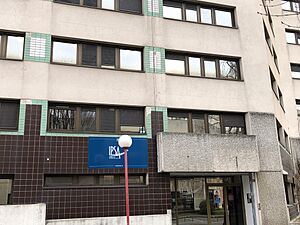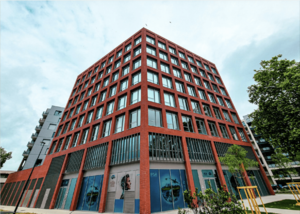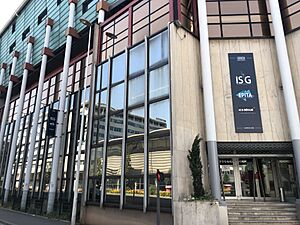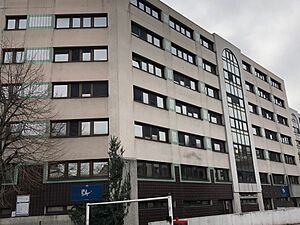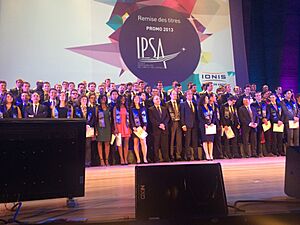Institut polytechnique des sciences avancées facts for kids
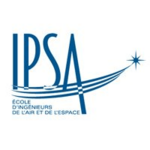 |
|
| Motto | L'air, l'espace, l'IPSA |
|---|---|
|
Motto in English
|
The air, the space, the IPSA |
| Type | Private, Grande École |
| Established | 1961 |
| Director-Général | Anne-Ségolène Abscheidt |
|
Administrative staff
|
200 (in 2022) |
| Students | 2,188 (in 2022) |
| Location | , |
| Campus | Urban |
| Colours | |
| Nickname | IPSA |
| Affiliations | 3AF, CDEFI, Concours Advance, Erasmus, ISSAT |
| Website | www.ipsa.fr |
The Institut Polytechnique des Sciences Avancées (IPSA) is a French private engineering school. Its name means "Institute of Polytechnic Science and Aeronautics." It focuses on aerospace engineering.
IPSA has campuses in Ivry-sur-Seine, Lyon, and Toulouse. The French government has recognized the school since 2010. Its diplomas have been approved by the French Commission des Titres d'Ingénieur since 2011.
The school was started in 1961. Since 1998, it has been part of the IONIS Education Group.
Contents
History of IPSA
How IPSA Started
IPSA was founded in 1961 in Paris. Three people started it: Michel Cazin, Maurice Pradier, and Paul Lefort. Twenty students began their studies there.
In 1982, students took their first school trip. They visited the European Space Agency center in Guyana. In 1987, Henri Hertert, an airline pilot and former IPSA student, bought the school.
The institute moved to a new location in Bagnolet in 1989. It stayed there for ten years. In 1998, the IONIS Education Group bought IPSA. The school then moved to Le Kremlin-Bicetre.
Growing Recognition
In 2005, the French state recognized the Master's degree from IPSA. This happened after an accreditation process. In 2007, IPSA opened a second campus in Toulouse. It also joined the Erasmus Programme. This program allows students to study abroad.
The school joined the Institut au service du spatial, de ses applications et technologies in 2008. In 2009, IPSA moved to Ivry-sur-Seine. The French state officially accredited the school in 2010.
In 2011, IPSA received accreditation from the Commission des Titres d'Ingénieur (CTI). This allowed the school to grant the official title of "ingénieur diplômé de l'IPSA."
The CTI noted that IPSA had strong points. These included motivated teachers and students. They also noted good job placement for graduates. The CTI also suggested areas for improvement. These included developing more research and improving students' English skills. IPSA quickly created a new entrance exam called Concours Advance.
In January 2013, IPSA joined the Conference of the Directors of French Engineering Schools. The CTI agreement was extended in May 2013. In 2018, the university received the EUR-ACE label. This is an international quality label for engineering programs.
Since January 1, 2021, IPSA has been a member of the Union of Independent Grandes Écoles. Since June 20, 2023, it has also been part of the Conférence des Grandes écoles.
The school organizes a yearly air show called IPS’AIR. The most recent show took place in February 2023.
School Directors
The current director of IPSA is Anne-Ségolène Abscheidt. She also serves as the Vice-President of Ingénieurs et scientifiques de France. She became the director of IPSA in June 2023. She is the tenth person to hold this position since 1961.
| Name | Years |
|---|---|
| Michel Cazin | 1961 to 1987 |
| Maurice Pradier | 1961 to 1987 |
| Paul Lefort | 1961 to 1987 |
| Henri Herter (IPSA 1976) | 1987 to 1998 |
| Guy Robin | 1998 to 1999 |
| Aimé Merran | 1999 to 2009 |
| Hervé Renaudeau | 2009 to 2016 |
| Francis Pollet | 2017 to 2022 |
| Valérie Cornetet | 2022 to 2023 |
| Anne-Ségolène Abscheidt | Since 2023 |
What Students Learn
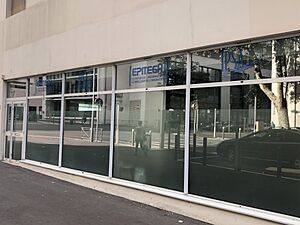
IPSA aims to train engineers for jobs in research and development. Students gain strong knowledge in aerospace engineering.
The school offers a five-year program. In the fourth year, students can choose from five specializations:
- "Energy, spacecraft propulsion and engine"
- "Mechanics and aircraft structure"
- "Telecommunications, radar and radio navigation"
- "Embedded systems"
- "Mechatronics"
Students also pick one of ten minor subjects. These include "Entrepreneurship" and "business marketing."
In the fifth year, students choose from four options. These are "Avionics" and "Aeronautical Systems Design." Other options are "Space Systems Design" and "Management and Industrial Logistics."
From the first year, students learn about aeronautics. They also get a strong science education. Much of the learning is based on projects.
Students can also earn an MBA degree. This is in "business and international negotiation." They can also spend their last year studying at a foreign university. The program includes eleven months of internships.
After graduating, students join the AAEIPSA alumni association. About 70% of graduates work in the aerospace industry. Most work in research and development.
Students can join IPSA after high school. They must pass the "Advance" competition. This exam is shared with other schools like EPITA. It is also possible to join in later years. This is for students from other university programs.
Since 2017, IPSA also offers Bachelors degrees in aeronautics.
Studying Abroad
IPSA has partnerships with universities around the world. Students can earn a Master of Science degree from these partners. Some partner universities are in China, the UK, Russia, Canada, and Taiwan.
Students can also take part in the Erasmus Programme. This program lets them study in other European countries.
IPSA also has agreements with The University of Arizona and University of California, San Diego.
Research at IPSA
In 2011, IPSA had three research labs. These focused on 3D computer graphics, mechatronics, and fluid mechanics. Fluid mechanics is about how liquids and gases move.
The 3D computer graphics lab studies new ways to analyze signals and images. They signed an agreement with a CNRS lab in 2010.
In 2006, a student group called IPS'action started a challenge. It involved research projects with other universities. In 2008, a UAVs (drone) project by students was chosen for a challenge. This project was called "Hélitronix."
The mechatronics lab also works on the "Perseus project." This project develops rockets for CNES, the French space agency. Students from the AéroIPSA association help with this.
IPSA is also part of the ASTech Paris Région group. This group helps develop areas like aircraft engines and aircraft design.
In November 2011, the fluid mechanics lab got a new tool. This allowed them to create a digital wind tunnel by the end of 2011. A wind tunnel helps test how air moves around objects.
An IPSA team won an award in 2011. It was the GIFAS award for a student aerospace challenge.
Notable Students
The French synchronized swimmers Charlotte and Laura Tremble are students at IPSA. They are expected to graduate in 2025.
Notable Alumni
See also
 In Spanish: Institut polytechnique des sciences avancées para niños
In Spanish: Institut polytechnique des sciences avancées para niños


